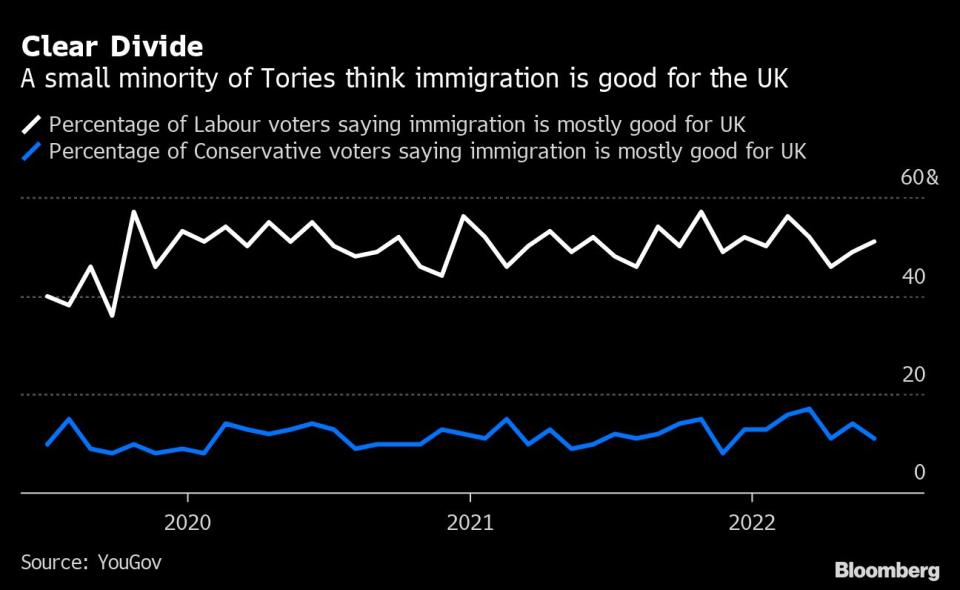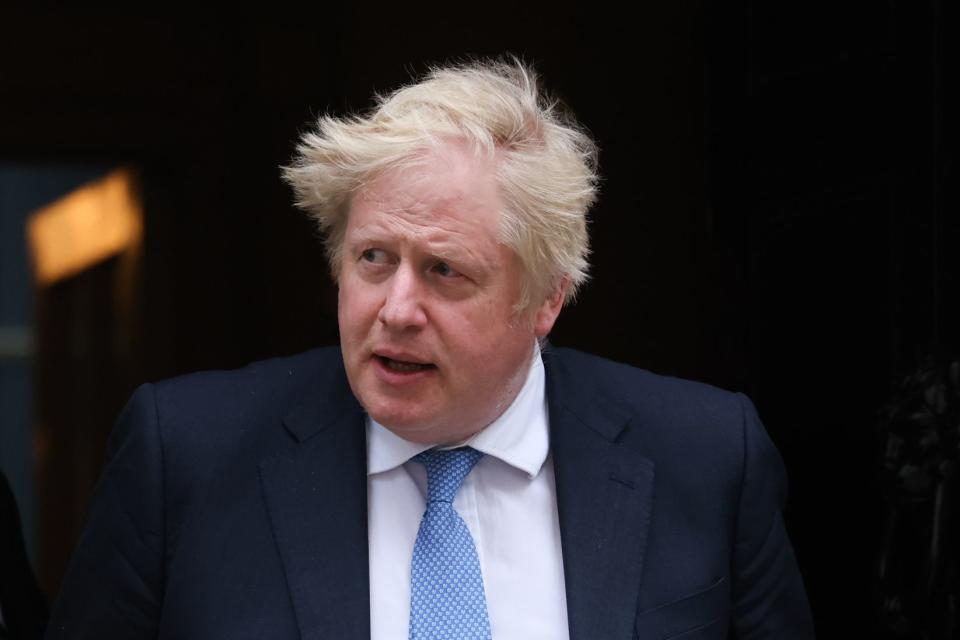Johnson Incites More Chaos After Wounding Confidence Vote
(Bloomberg) -- Boris Johnson’s response to nearly being booted out of office by his own Conservative Party last week has been to pick more fights, pushing forward with his most divisive policies and triggering the anger of opposition parties, the European Union and even the UK’s most senior clergy.
Most Read from Bloomberg
China Says It May Have Detected Signals From Alien Civilizations
Stocks Jump as Powell Soothes Wall Street’s Nerves: Markets Wrap
Fed Hikes 75 Basis Points; Powell Says 75 or 50 Likely in July
World’s Central Banks Got It Wrong, and Economies Pay the Price
Americans Are Building Vacation-Home Empires With Easy-Money Loans
Far from seeking political calm, Johnson is inciting more chaos. During a cost-of-living crisis, the premier proposed a law to rip up his Brexit deal, risking a trade war with the UK’s biggest trading partner. As rail unions prepare to bring the country to a standstill, ministers are standing back and allowing strikes to happen, while slamming the unions organizing them. A plan to deport asylum seekers to Rwanda drew a rebuke from the heir to the throne.
The approach does little to allay the impression of a government and country in disarray -- and Johnson’s critics argue that is exactly the case.
But on Johnson’s team, there is a strategy. According to two people familiar with the matter, government advisers are being encouraged to come up with policies and ideas to set Johnson’s Tories apart from the opposition. David Canzini, Johnson’s deputy chief of staff, calls in regular Friday meetings for aides to help refocus the government’s political identity, they said.
Brexit, deportations and criticizing labor strikes are all favorite themes of the right wing of Johnson’s Tories, and he has typically responded to periods of strife by handing them what the British media dubs “red meat” policies to shore up support.
Brexit Appeal
Yet what they also have in common is the opposition Labour Party’s reluctance to take a firm position. That stems from fear of alienating voters they think they need to win over, especially in the so-called red wall seats that swung to Johnson’s Conservatives in the 2019 general election.
Johnson won a sizable majority on the back of his pledge to “get Brexit done,” and there’s still a belief among both Tories and Labour that the key to winning the former Labour heartlands next time is to appear strong on immigration and on delivering the promised benefits of Brexit.
On Wednesday, Labour tried to hit back.
Facing Home Secretary Priti Patel in Parliament, Labour’s Yvette Cooper accused the Tories of presiding over a “shambles” after the first planned deportation flight to Rwanda was blocked late Tuesday by legal proceedings.
‘Pursuing Division’
“It’s not serious policy, it’s shameless posturing,” Cooper said. “It’s not building consensus. It’s just pursuing division.”
Cooper’s intervention came soon after her party leader, Keir Starmer, made a similar accusation against Johnson in the Commons, saying the prime minister wanted rail strikes to go ahead next week. “He wants the country to grind to a halt so that he can feed off the division,” Starmer said.
The comments reflect a sense in Labour that the government is pleased about the focus on the so-called wedge issues of immigration, Brexit and strikes, even if the media criticizes the government’s plans.
Officials in Johnson’s office denied that was the case. His press secretary said Wednesday the timing of strikes was the union’s decision and the flight to Rwanda was already scheduled. His spokesman, Max Blain, said negotiations between unions and rail companies were not a matter for the government.
Still, the approach is also worrying some Tories ahead of two special elections on June 23 that threaten to lay bare the risk Johnson is taking.
One is in Wakefield, west Yorkshire, a Red Wall seat the Tories took from Labour in 2019. In theory, it’s a constituency where Johnson’s recent moves should play well -- though the picture is clouded by the fact that election was triggered because the sitting Tory MP was found guilty of sexual assault.
The other vote is in Tiverton and Honiton, southwest England -- a traditional Tory “blue wall” rural seat being targeted by the Liberal Democrats, who are trying to overturn a huge Tory majority and maintain momentum after taking two similar districts in recent by-elections. Some MPs blame those losses on Johnson’s focus on the north.
‘Risky Move’
“The two by-elections on the same day are a real exemplar of the dilemma that the Tories face,” said Meg Russell, politics professor at University College London. “A policy pivot towards Wakefield -- if this really is what this is -- feels like a risky move when it may just blow Tiverton for you.”
While Johnson’s team say they are looking ahead to the next general election, due by January 2025 at the latest, a poor performance by the Tories next week will almost certainly renew calls from his MPs for him to step down.
The prime minister was damaged by the scale of last week’s rebellion, with four out of 10 Tory MPs voting to oust him. This week’s moves look directed at shoring up or winning back a portion of those on the right, with precious little to appease the centrists or so-called softer Tories. The willingness to attack the bishops -- a traditional bastion of Toryism -- over their criticism of the planned deportations reflects how far Johnson is now shifting the party.
But some Tories say it’s far from certain to succeed.
“We have to be very careful to recognize the enormous scale of the different problems that are besetting Britain,” Andrew Mitchell, who voted against Johnson last week, told BBC Radio. “At times it feels too much like government by slogan.”
Most Read from Bloomberg Businessweek
Sheryl Sandberg’s Wedding Expenses Are the Least of Facebook’s Sheryl Sandberg Problems
Janet Yellen Is Struggling at the Treasury Job She Never Wanted
A Ragtag Band of Hackers Is Waging Cyberwar on Putin’s Supply Lines
A Billion-Dollar Crypto Gaming Startup Promised Riches and Delivered Disaster
The Fed Tried to Protect Main Street. Now It May Have to Make Everyone Suffer
©2022 Bloomberg L.P.

 Yahoo Home
Yahoo Home 


